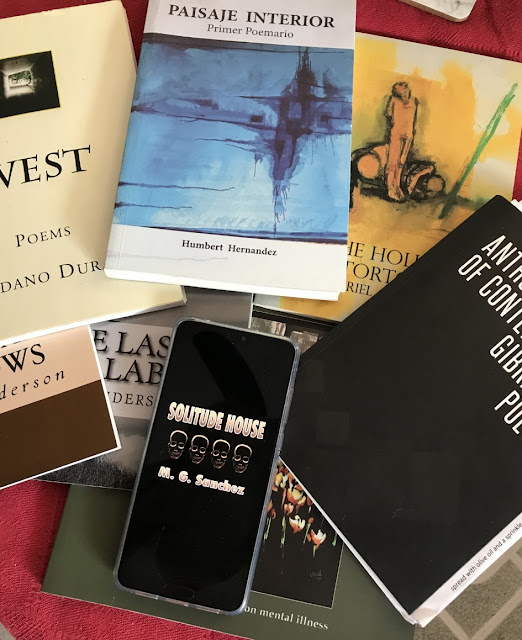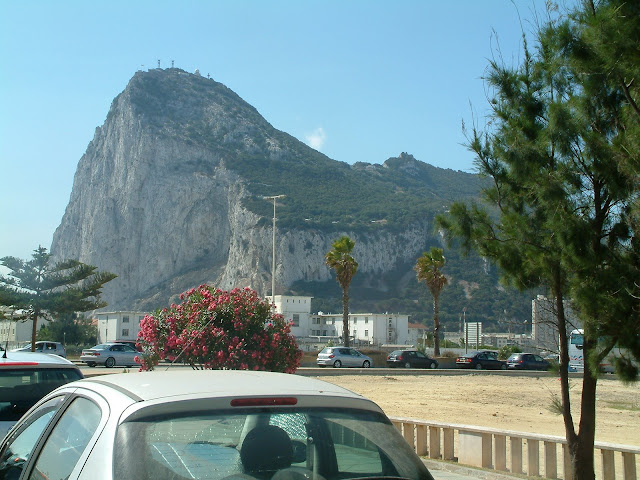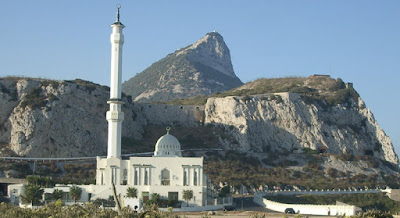
Gibraltar Writers in the spotlight
I'm going to start this post by writing about Gibraltar's Literature Week. Organised in the place of the annual International Literary Festival which was cancelled this year because of the Covid19 pandemic (and just as well, I guess, given the second spike the autumn is seeing grow alarmingly throughout the world), Literature Week gave a voice, albeit small, to some of Gibraltar's writing community.
There's nothing wrong with small, I hasten to add, and given that it was only a week long, Gibraltar Cultural Services, the government agency that organised the Week and all the events that it involved, there was plenty of ground covered. There were talks and readings for school children, Gibraltar's two most prominent playwrights shared their tips and passion for writing plays also with school children, there was story telling for kids in the park, the announcement of the poetry competition winner (well done, Rebecca Faller) and there were three 'meet the author events' per day throughout the week. These were filmed within the constraints of Covid19 regulations, which meant we couldn't actually meet the authors. Instead the sessions were live streamed on Facebook, which means that those who could not physically attend, for whatever reason, could either tune in live and listen to local authors talk about their work and chat about all sorts of other issues mostly pertinent to Gibraltar, its people and its culture, or could catch up on the recorded version later.
For me, and many others I have spoken to this week, that was an instant hit. It meant that Literature Week succeeded where the International Literary Festival does not - it brought Gibraltarian books and authors to a wider public, including an international public (a friend of mine in US tuned in to some of the talks, for example, as well as family in UK). It meant that those who struggle to leave home, and did so even in the halcyon pre-pandemic days, could watch and listen and join in to an extent through the chat functions. Those of us who could not take time off work could catch up with recorded versions, and those who might not normally engage with events that perhaps have a touch of elitism about them, were able to watch from the quiet anonymity of their homes. I'm not going to rant on about literary festivals and elitism - but it is a feature of festivals and something that has been openly discussed across the world for years, and it is something that was happening here too. Not this year though. I have no idea what the viewing figures have been, but I hope they were good, because this was a very accessible and worthwhile format for introducing Gibraltarian writers to Gibraltar and beyond. In other words, whether they realised it or not, Gibraltar Cultural Services created a platform for writers.

A platform for writers
Why is a platform necessary? And in particular, why is it important for a small city, a self-governing territory still tripping over the remains of its colonial past, to create a 'national' platform for its writers?
I'm not going to go into an academic essay - I am not an academic and there are those professors out there who are expert in Gibraltar and Gibraltarian literature who would do much better justice to the subject. But I will say that, just like we talk about a platform for businesses, or a digital platform for marketing, we should be talking about creating a platform for Gibraltar's writers so that our literature, our stories, can gain better exposure at home, and more importantly, across the rest of the world. Heck, we might even sell some books!

In turn, that is important if we are going to develop our writing as individual writers and as an independent, identifiable, unique community. It's a lonely pastime, writing. We don't all have the chance to take writing degrees, or gain any objective or external perspective on our work. Unless our writers try to publish abroad, they usually have to self-publish to have their work read, and self-published work usually benefits from close scrutiny and revision before publishing. We have to head online and out of Gib and try to fund our own critiques, editing and so on. We have to help each other by being each other's beta readers, which is jolly tough if you're also trying to earn a living and raise a family. Because, of course, like many other art forms, such as music, in its early stages (most of its stages, if truth be told) writing simply doesn't pay that much.
A platform for writers in Gibraltar could involve creating regular events such as Literature Week, but perhaps hold them more regularly. They could be themed e.g. young writers' week, writing from the Gibraltarian diaspora, Gibraltar and writers of the Maghreb, Gibraltarian and Iberian writing, writing and mental health, writing and your family history, Gibraltarian literature and our varied languages and so on ad-infinitum. While this first literature week (because I do hope it is only the first of many) took what was clearly a very broad view of literature to include memoirs, history books, photobooks and art books, and perhaps was less literary than some might have wished, it did succeed in showcasing some of our writers and it did so in two of our cultural languages. I have to say only two, because with strong Hindu, Moroccan and Jewish communities to name just three, we are a multi-lingual society and writers can and should write in whichever language they feel comfortable doing so. A body of literature can celebrate that linguistic diversity as it can celebrate its own patois (for want of a better term to try to define llanito).
A platform for writers could also bring about a development of local skills through workshops. It could foster a sense of community for writers, an inclusive community that doesn't start with a red ID card or end when you pop over to the other side of the border for a few years. It could help grow book sales, and foster reading and literacy. It could, above all, become the launch pad for international careers as writers, to grow an international audience for Gibraltar.
This is not a task for one government agency to do alone. There are all sorts of issues that hamper government bodies from achieving such things, not least budgetary and time constraints or the policy priorities imposed by whatever political leadership is in place at any one time. But the initiative, and often facilitation, encouragement and empowerment for growing a platform for literature, does move faster with real support from government. And if the fostering, nurturing role by government is carried out properly, objectively, then the community of writers is likely to be able to take it forward further. Provided, of course, that independence is kept at the fore of the platform. Otherwise, its direction is too easily influenced, its strength diluted.
What else for Gibraltar's writers?
Gibraltar's writers have a little bit of support. Literature Week was one event, only a small number of Gibraltar's writers got the chance to showcase their work. Some, I am aware, felt a little neglected to say the least. The Youth Arts Jamboree usually includes poetry and writing workshops and at least writing is included. There is an annual government run poetry competition and similarly an annual short story competition.
So far so good. But Gibraltar is missing so much. There are no bookshops. There are no creative writing classes. There is no real recognition. There is one publisher only. The support for publishing is in the form of a loan. There are no incentives to take a break from working and dedicated time to your art. This year is the first year that the prize for the poetry competition has finally begun to reflect the work and effort and sheer talent that goes into writing a good poem worthy to be showcased as the best in Gibraltar at that point in time. Oh, and there are no bookshops - have I said that already?
The space in which support for literature and the literary arts could grow is...exactly that. Spacious. Support is small, intermittent, dependent on what or who happens to be in flavour at any one time, which itself depends on what is written and how. I'd like to see open public discussions about the nature of some of Felice's plays for example: maybe Utrecht, and Flavius, which touch on some significant Gibraltarian issues and events. Yes, plays, and yes, writing. Durante's poems, along with Hernandez, Cruz, Faller, Moreno could easily fill hours of teaching time to support English lessons, as could the novels of Sanchez, with their gritty realism redolent with the familiarity of the Gibraltar that we all know and many would like to prefer stays tucked away behind a veneer of glitz aimed at appealing to Cat 2 economic migrants. Sorry, my bad, high net worth individuals. I have no problem with anyone who wants to live in Gib, whatever their socioeconomic status, but I do have a problem with pretending our reality does not exist.
But I digress. The Literature Week was a good alternative to the Literary Festival, and even when the Festival returns, the Literature Week should remain. And it should grow and be enhanced. And writers should really think hard about committing a bit of time and energy to creating a platform to help Gibraltar's writing emerge into the spotlight, to stand up and be read and heard not just on the Rock but across the world. As Humbert might have been going to say in his Literature Week talk before he was outrageously cut short - no government has ever really committed to literature. We've had tourism led events, we've had a little offering. Writers need so much more if the stories and the art that they can produce are to take up their rightful place on the bookshelves and stages and radios and screens of the world.
If you are a writer, and you feel you would benefit from a local platform for your work, both physical and digital, comment below or email me: jackiegirl@hotmail.co.uk. Maybe if we press hard enough together, it will happen.










































